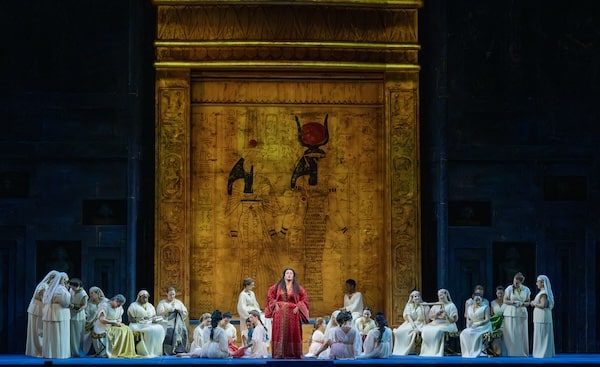‘15% of the new works we perform are by women’ (but less than 2% of the old)
mainThe Baltimore Symphony has conducted a survey of 21 major US orchs. Here’s what they found.

The Baltimore Symphony has conducted a survey of 21 major US orchs. Here’s what they found.

There were protests during Christmas mass at Freiburg…

From the Berliner Zeitung: …How dangerous real music…

The Raiders of the Lost Tomb version. It’s…

A tenor who was audibly below par, an…

Session expired
Please log in again. The login page will open in a new tab. After logging in you can close it and return to this page.
And this despite the huge popularity of the works of Amy Beach, Lili Boulanger, Ethel Smyth, Maria Theresa von Paradis, Clara Schumann, Grace Williams et al. Institutional sexism is the only conceivable explanation.
What’s always sad about this discussion is that it is all about meeting quotas and not about quality. Why is so hard for people to accept that up until this point, the best composers were men? If the public really had a taste for Amy Beach or Lili Boulanger (to name the first two on your list), then they would get played. Period. The fact is that there are also a lot of mediocre male composers out there as well. And guess what? The public doesn’t want to hear any of them either. Institutional sexism is most definitely NOT the problem. Quality definitely is. That the general public prefers Robert to Clara Schumann is simply a fact and we shouldn’t waste our time wishing it were otherwise.
what’s the ratio of male to female composers overall?
In an attempt to rectify this imbalance programming, the organization Women’s Philharmonic Advocacy is currently offering grants to U.S. orchestras for the programming of works by women. Applications due Nov. 19.
What a bore! Don’t Baltimore staffers have better things to do?
It’s a difficult situation: historically, it’s surely likely that the female Beethovens and Schuberts were indeed simply silenced. We can never know, and I’m not sure that pretending that all the women who did overcome prejudice to write music were de facto on that level is helpful. IMHO Clara Schuman and Fanny Mendelssohn’s music certainly merits as much attention as, say, Raff’s or Sterndale Bennett’s. More than that is simply tokenism.
As regards earlier 20th century female composers (in Britain, for example, Ethel Smyth, Ruth Gipps, Grace Williams, Phyllis Tate) from what limited research I’ve done, they seem to have received a comparable amount of attention as their male contemporaries in their own time – and are now neglected in proportion; they’re played no more than (and for the same faddish, snobbish reasons as) (eg) Granville Bantock, William Alwyn, Daniel Jones, etc. When we’ve played these composers to audiences, they’ve loved it. The problem is getting it programmed against an anti-tonal, anti-romantic critical consensus. I’m not convinced gender comes into it, today anyway.
In more recent times, the situation is much more problematic; clearly there are very major female voices at work and if they are encountering genuine professional hindrances because of their gender, or are receiving a smaller proportion of overall new-music performances, then this needs to be addressed ruthlessly and without hesitation. More detailed statistics would be useful. But this is contemporary classical music we’re talking about. Vanishingly small quantities are played, irrespective of who wrote it.
In short: there’s a very limited quantity of significant pre-20th century orchestral music by women for orchestras to play; many major 20th century female composers are neglected for stylistic rather than gender reasons; and (like it or not) there is simply no wide public for contemporary classical music by composers of either gender. The cake is absolutely tiny; nonetheless, it absolutely needs to be fairly sliced. But these “1%” generalised shock stats don’t tell us anything particularly useful and may simply entrench unhelpful prejudices and assumptions.
*gets coat*
Much ado about nothing. History is history. Today women are free to compose and to be performed. No discrimination exists against women at present, quite to the contrary. Who claims otherwise please proof your case. No more bullshit please.
No discrimination against women exists today? What utter bullshit. Please provide the proof for your crass and incredibly un-educated statement.
One only has to look, for example, at the number of women composers included in the BBC Proms in recent years to see that they face immense difficulties in getting their music heard by a large audience. Look at the recent figures for nominations for BASCA awards – 24% were female yet all the winners were male – or the RPS Composition Awards where all five winners were male this year. There is most definitely still a problem here.
And what sort of example does it set to young, female composers who are just starting out in their careers, or perhaps even younger and studying for their degree or A Levels, if the majority of music they see being programmed and winning awards is the same (mostly) middle-aged white men, or older?
Women may be free to compose and have their music performed more than ever before, and indeed the situation is far better in 2014 than it was even in 2010. But when only 7% of the BBC Proms programme involved women composers; when not a single woman was included in the winners lists of two of the top composing competitions/awards in the UK; and when there are still selection panels and shortlists that do not include a single woman among them, then we still have a problem and equality is far from achieved.
Perhaps the simple answer is that the music industry is still institutionally weighted towards men and therefore women aren’t on the agenda, or they are unaware that a problem even exists still because they programme a female composer once in a blue moon? With men calling most of the shots in most of the senior positions that are helpful to exposing new composers – conductors, artistic directors, BBC programmers, record label executives – then it’s no wonder at all.
The music industry is certainly “institutionally weighted” towards music from the period 1600-1950, that’s for sure. Do we have any statistics for number of living female composers – and how their performances stack up proportionally against living male composers?
I’d want to know the make-up of the competition juries before concluding for certain that there’d been discrimination there. Interestingly, the two most prominent new-music publishing houses (in the UK, at any rate) have been headed by highly respected and influential women for much of the last two decades. In ten years of commissioning and performing new music by composers of both genders, I don’ t think I’ve dealt with a single male senior executive.
Perhaps the “simple answer” is rather, that women do not explore the composition opportunity that much. There are no easy answers anyway, but your fallacy from concluding of lesser quantity in a field to automatic discrimination by men is just that: a fallacy.
Ask the renown conservatories how many qualified female applicants they have for composition studies, and then reflect on the issue again. Women are free to do anything these days – in our neck of the woods – which doesn’t mean that they necessarily want to, in the same quantities as men…
Halldor thinks there is no sexism now nor has there ever been any. Would that we could live on that imaginary planet where meritocracy reigns! As Richard Taruskin writes in his massive tome, “the life of Fanny Mendelssohn Hensel is compelling proof that women’s failure to ‘compete’ with men on the compositional playing field has been the result of social prejudice and patriarchal mores, … not the natural deficiency that defenders of the status quo dependably allege.”
Have a re-read of what I wrote. I think you’ll find I’m saying precisely the opposite of what you’ve just suggested.
You do know that that was almost 200 years ago, right?
Good, fix an evening in the provincial Meyerhoff Hall solely with works by Maria Magdalena, Fanny, Clara, Alma and in the 2nd part Amy Beach, Ethel Smyth, Lilli and Adriana Hölzky added as an exclusive subscription concert for an exclusively female audience and good luck. P.S: Sorry about this ill-intentioned joke. I didn’t add Sofia Gubaidulina, Thea Musgrave and Kaija Saariaho out of respect to their merit, not their gender.
Sorry, I meant Anna Magdalena, not Maria M!